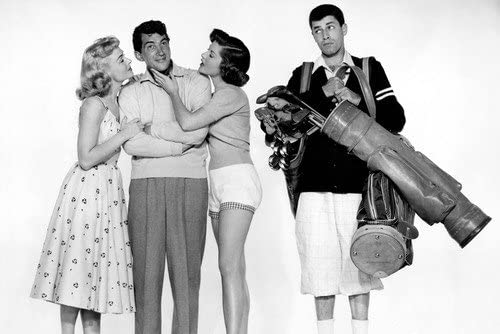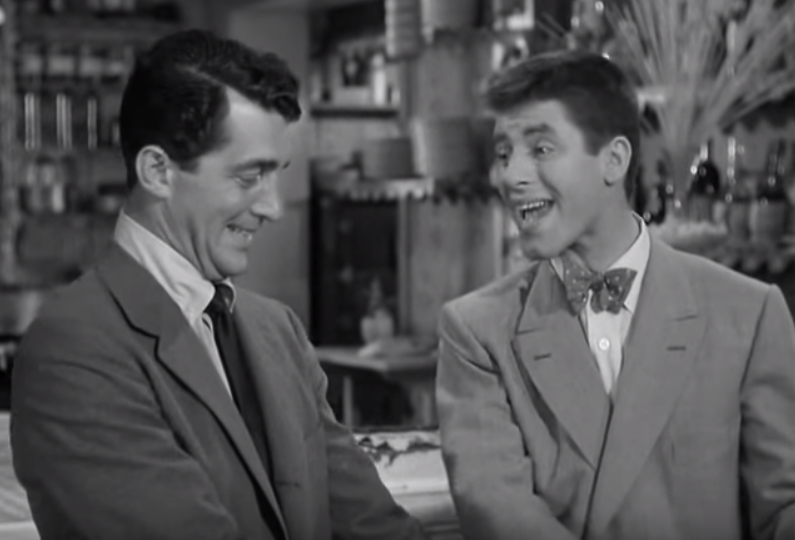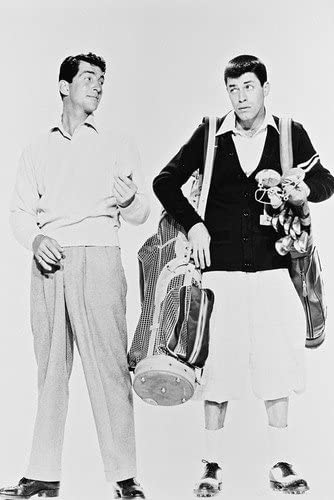The Caddy (1953) starring Dean Martin, Jerry Lewis, Barbara Bates, Donna Reed
The Caddy is an above-average Lewis and Martin comedy. It features singing by Dean Martin (including the Academy Award-nominated “That’s Amore” ). Also slapstick antics, and pathos, from Jerry Lewis.
![]() The movie begins with a bang, showing Joe Anthony (Dean Martin) and Harvey Miller, Jr. (Jerry Lewis) doing their zany, manic stage show—one of the highlights of the movie. Backstage, a reporter tries to get the story of how the team came together, and Joe’s father tells the story. The bulk of The Caddy is then told in flashback, telling that story.
The movie begins with a bang, showing Joe Anthony (Dean Martin) and Harvey Miller, Jr. (Jerry Lewis) doing their zany, manic stage show—one of the highlights of the movie. Backstage, a reporter tries to get the story of how the team came together, and Joe’s father tells the story. The bulk of The Caddy is then told in flashback, telling that story.
Restaurant and fishing
Joe Anthony’s family runs a restaurant and fishing business. Seasick Joe travels the country trying to find his own niche, against his father’s wishes. Likewise, Harvey Miller Jr. was raised to be a golf professional like his father and is indeed an excellent golfer. However, he is petrified in front of crowds, and so is unable to play in tournaments. He is fired from a series of jobs, the most recent being a department store.

In a wonderful bit of slapstick comedy, Jerry Lewis destroys much of the department store …. As his boss is chasing him in order to fire him. A classic bit of prop comedy as one knocked-over display knocks over another in a domino effect. With Jerry Lewis being tossed back against the shelves, causing all of the shelves to collapse. Then, all of the fine china on display to break. At his fianceé Lisa Anthony’s (Barbara Bates) suggestion, Harvey decides that since he can’t golf, he can teach. So he will start giving golfing lessons.

Harvey goes home with Lisa (no, it’s not like that—he rents a room from Lisa’s parents). After Harvey is asleep, Lisa Anthony’s brother Joe comes home and sneaks into his old bedroom to go to sleep. Except, of course, that Harvey’s sleeping in there. After a short confusion, all gets worked out. The following night is a ‘welcome home’ party for Joe, giving Dean Martin an excuse to sing “That’s Amore”. The song earned the movie an Oscar nomination. Joe comes upon Harvey giving his sister (and Harvey’s fiancée) Lisa a golf lesson. This inspires them to have Harvey teach Joe golf in order to win tournaments …. And pay off the large boat that Joe’s father bought upon Joe’s return home.
Golf tournaments
This works, and the lower-class Joe and Harvey are fish out of water at the upper crust at the country club. Where Dean meets and falls in love with high-society Kathy Taylor (Donna Reed). While there, the two are separated, with Harvey spending time with the other caddies. But Joe spends his time with the upper-crust fellow golfers.
Despite Harvey’s warnings, Joe goes to a dance party with Kathy. When Joe is late, Harvey goes to retrieve him. Hilarity ensues when Harvey interrupts Joe’s singing, cracking up one of the other party goers (later revealed to be a talent agent). Joe won the tournament but is forced to donate the $500 winnings to charity.
Practice makes perfect?
Kathy then takes Joe to her mansion, where he promises to practice every day—although he leaves his clubs behind. Harvey tries to sneak into the mansion, where Joe is putting on airs. Harvey does a very funny turn at impersonating an upper-crust person with his rendition of “The Gay Continental”. This had my 12-year-old daughter in stitches. In order to stay by Joe, Harvey becomes an inept waiter. He ruins a party, miscommunications happen, and Joe leaves in a huff.
The big tournament is about to begin. Thanks to intervention from Harvey and the police, Joe shows up in the nick of time. However, Joe’s family shows up as well. One thing leading to another and ending with a near-riot at the golf course. The agent is there again (as well as at the party that the boys broke up). He tells them that they are wasting their talents, and should be on the stage.
In the end, everything works out, since we know from the start of the movie that they did get on the stage, and all is well. The movie ends with a very cute “cameo appearance” by Dean Martin and Jerry Lewis in their own movie.
Part of the Dean Martin & Jerry Lewis Collection.
Quotes from The Caddy, starring Dean Martin, Jerry Lewis, Donna Reed
Kathy Taylor (Donna Reed): [At an elegant country club soiree] Good evening.
Joe Anthony (Dean Martin): [Feeling underdressed and out of his element] I better make that ‘good night.’ I’m out of uniform.
Kathy Taylor (Donna Reed): You’re positively stunning. So what if you left your dinner jacket at home?
Joe Anthony (Dean Martin): I left it in Kansas City, but I can show you the pawn ticket.
Kathy Taylor (Donna Reed): I believe you. Shall we dance?
Joe Anthony (Dean Martin): Only if I lead.
Kathy Taylor (Donna Reed): You can lead.
Cast of characters
- Dean Martin (Scared Stiff) … Joe Anthony
- Jerry Lewis (Visit to a Small Planet) … Harvey Miller, Jr
- Donna Reed (It’s a Wonderful Life) … Kathy Taylor
- Barbara Bates (All About Eve) … Lisa Anthony
- Joseph Calleia (Five Came Back) … Papa Anthony
- Fred Clark (The Curse of the Mummy’s Tomb) … Mr. Baxter / Old Skinhead
- Clinton Sundberg (In the Good Old Summertime) … Charles – the Butler
- Howard Smith (A Face in the Crowd) … Golf Official
- Marshall Thompson (Cult of the Cobra) … Bruce Reeber
Trivia about The Caddy, starring Dean Martin, Jerry Lewis, Donna Reed
- The Caddy was re-released in 1964 on a double bill with another Martin and Lewis picture, You’re Never Too Young.
- This was the team’s first film since 1950’s At War With The Army to be produced by their own production company, York Pictures Corporation.
- Actual footage of Martin and Lewis’ 1951 appearance at New York’s Paramount Theater is integrated into the film’s opening.
- ‘That’s Amore’, sung by Dean Martin, became a multi-million seller and one of his signature songs. The tune also appeared in the closing credits of Rear Window and is regarded as the theme song to Moonstruck
- Was the second York Pictures Corporation production, a company owned by Dean Martin and Jerry Lewis. Prior to making the film, the duo paid $850,000 to extract themselves from their contract with Screen Associates, the company that had underwritten York’s participation in At War with the Army, the company’s previous production.
- The Central Intelligence Agency was concerned about the portrayal of race relations in Hollywood films. In the early 1950s quietly contacted a number of film studios about using more African-American actors in small, subtly positive roles. One result was the smattering of black observers in the crowd during this film’s big golf game



